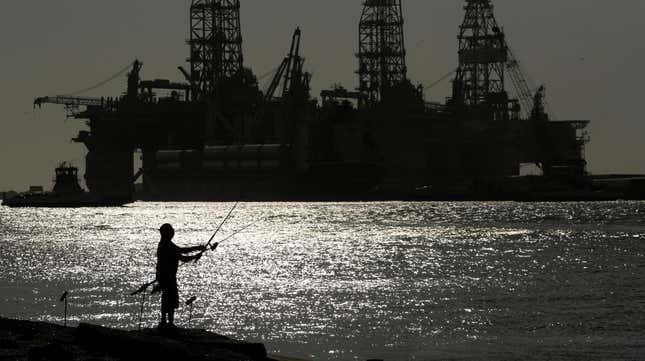
In a rare nugget of climate-related good news, the U.S. Department of the Interior announced Wednesday that it is canceling three offshore oil and gas drilling lease sales: one in Alaska’s Cook Inlet and the other two in the Gulf of Mexico.
The move means millions of acres of coastal waters will no longer be sold and subject to fossil fuel extraction. And, more broadly, it also means the U.S. won’t be holding any offshore lease sales at all this year, as those were the only ones on the docket.
“Due to lack of industry interest in leasing in the area, the Department will not move forward with the proposed Cook Inlet OCS oil and gas lease sale 258. The Department also will not move forward with lease sales 259 and 261 in the Gulf of Mexico region, as a result of delays due to factors including conflicting court rulings that impacted work on these proposed lease sales,” wrote a Department of Interior spokesperson in an emailed statement to Gizmodo.
The federal five-year offshore drilling program expires on June 30, and the Biden Administration has announced no plans to replace the program, signaling that they might not. No surprise: fossil-fueled politicians and the petroleum industry are upset about it.
Multiple Republican representatives, including Alaska Senator Lisa Murkowski, have tied the program’s likely lapse to the issue of high fuel prices (though, any drill leases issued now would have no immediate effect on domestic fuel availability). And an exec from the fossil fuel lobby group the American Petroleum Institute told CBS that the lease cancellations are “another example of the administration’s lack of commitment to oil and gas development in the US.”
But others see it differently. “This is great news for our climate, communities and imperiled wildlife,” said the Center for Biological Diversity’s Ocean Program litigation director, Kristen Monsell, in an email to Gizmodo. “Taking these leases off the table means the decades of carbon emissions, oil spills and toxic pollution they would have caused won’t occur.”
It’s been a tough week on the climate beat (in other words, a typical week). There’s carbon bombs to worry about and fossil fuel industry deception. There’s historic drought and growing western water shortages. There are key benchmarks of warming that we’re growing ever-closer to exceeding.
Yet on this fine Friday, Gizmodo recommends you take a moment to rejoice in the knowledge that, with these lease cancellations, at least some fossil fuels will be staying in the ground for now. And we really need them to, if we want to avoid the worst impacts of climate change.
In the Gulf of Mexico, where so much offshore drilling already takes place, there have been countless catastrophes and more waiting to happen. The environmental impact statement covering the now-canceled leases reported that 2,244 total oil spills occurred off the coast of Gulf states between 2002 and 2015. But no new leases means fewer drill rigs, less oil to transport, and fewer future spills.
The Alaska leasing area would’ve covered about 1.09 million acres of the Lower Cook Inlet, a waterway bordered by the Kenai Peninsula and Lake Clark National Park and Preserve. There are glacier-topped mountains on all sides and an endangered population of beluga whales. Now, there won’t be more offshore drilling there, too.
A draft environmental impact statement assessing what could’ve occurred, were the new Cook Inlet area to be drilled, cites a long list of “unavoidable adverse environmental effects.” Those projected, inevitable consequences include worsening air and water quality, loss of marine and terrestrial life, and loss of subsistence and commercial fishing opportunities. Now, none of that is going to happen.
Ultimately, it was legal tie-ups that led to the Gulf cancellations. A federal judge invalidated a November 2021 sale there, citing a Department of Interior failure to adequately take climate change into account. And there was a Biden Admin appeal in a court battle between multiple red states and the Administration over the “social cost of carbon.” Both court battles ended up putting leases 259 and 261 on hold. The pause went on long enough that eventually, the U.S. Bureau of Ocean Energy Management ran out of time to plan and enact the sales before the June 30 expiration date, according to an April congressional report.
In Alaska, things were a little more straightforward: the industry reportedly just wasn’t interested in bidding on the Cook Inlet proposed lease sites. The Bureau of Ocean Management previously canceled lease sales in the Cook Inlet in 2007, 2008, and 2011—citing the same lack of industry interest then, according to reporting by the New York Times.
The oil and gas company Hilcorp, which acquired a federal lease during sale 244 in 2017, is currently the only operator drilling in the Cook Inlet, according to the Center for Biological Diversity’s Monsell. “It’s a harsh environment to operate in due to weather, darkness, ice and other conditions which makes the numerous harms inherent in offshore drilling even riskier. Hilcorp has had numerous oil spills and gas leaks in the Inlet from platforms and pipelines; and problems with trying to stop them from actively spilling or leaking due to ice and other issues,” she told Gizmodo.
But despite this glimmer of positivity, just a couple of weeks ago, Biden reneged on a promise to cease oil and gas drilling on federal lands—allowing fossil fuel leasing to continue in some new areas. Drilling and fossil fuel extraction continues all over the U.S.’s offshore waters.
“Much more must be done,” wrote Monsell. “To save imperiled marine life and protect coastal communities and our climate from pollution, we need to end new leasing and phase out existing drilling.”